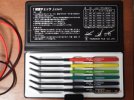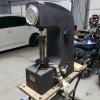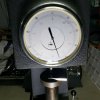-
The BladeForums.com 2024 Traditional Knife is ready to order! See this thread for details: https://www.bladeforums.com/threads/bladeforums-2024-traditional-knife.2003187/
Price is $300 ea (shipped within CONUS). If you live outside the US, I will contact you after your order for extra shipping charges.
Order here: https://www.bladeforums.com/help/2024-traditional/ - Order as many as you like, we have plenty.
You are using an out of date browser. It may not display this or other websites correctly.
You should upgrade or use an alternative browser.
You should upgrade or use an alternative browser.
hardness tester
- Thread starter golfer1
- Start date
weo
Basic Member
- Joined
- Sep 21, 2014
- Messages
- 3,012
Depends....what's your idea of 'affordable'?Is there such a thing as an affordable one?
Bühlmann
North Lake Forge
- Joined
- Jan 6, 2022
- Messages
- 475
There's Tsubosan hardness files that are inexpensive and go from 40-65 HRC in increments of 5. Cheap & easy, but there's technique involved (not difficult at all) for accuracy and you will only get the +/-2.5 accuracy. I'm a rookie, so that's what I use and they are a good learning tool for me. Beyond that I think they get into the $1000+ pretty quickly. Those are waters I haven't waded into yet. I'm interested to see what others have to say.
Last edited:
Joshua Fisher
Knifemaker / Craftsman / Service Provider
- Joined
- Mar 27, 2018
- Messages
- 1,501
Another relative hardness tester than can be great on a budget are hardness chisel, Matthew Parkinson makes sets of them that are hardened to be 2 point apart. The set I have the chisels are hardened to 64,62,60,58 and the idea is if the chisel cuts into the edge it’s harder but it it doesn’t bite or cut in it’s softer than the blade or the same hardness. I think they are a bit more accurate than hardness files. You can also use them to check other relative tests like a file. I buy the same brand chainsaw files and they pretty much always test around 62 so I’ll use those after quenching just to make sure I had my temp and soak right in my kiln and then after tempering I can check with the hardness chisel to confirm. In my opinion they help give some level of repeatability, they may not be as accurate as a calibrated hardness tester but they can help you check your ht.
- Joined
- Mar 28, 2020
- Messages
- 6,427
There's Tsubosan hardness files that are inexpensive and go from 40-65 HRC in increments of 5. Cheap & easy, but there's technique involved (not difficult at all) for accuracy and you will only get the +/-2.5 accuracy. I'm a rookie, so that's what I use and they are a good learning tool for me. Beyond that I think they get into the $1000+ pretty quickly. Those are waters I haven't waded into yet. I'm interested to see what others have to say.
Yep, I like my files. I don't need to be really accurate. I heard that there are files that are more accurate.

A.McPherson
Knifemaker / Craftsman / Service Provider
- Joined
- Jan 27, 2012
- Messages
- 2,858
Just search for "Wilson hardness tester" on eBay or whatever auction/garage sale site you want. You can find them cheep-ish, I got one for 400$.
However! If you buy one used, be prepared to spend some time and money getting it set up.
They often are missing parts, especially the weights.
I saw one on eBay for 450 today... I'd say don't pay more than 1k on a used machine, you can get a new Chinese knock-off for not much more.
However! If you buy one used, be prepared to spend some time and money getting it set up.
They often are missing parts, especially the weights.
I saw one on eBay for 450 today... I'd say don't pay more than 1k on a used machine, you can get a new Chinese knock-off for not much more.
Last edited:
I bought a used Ames Portable Hardness tester on ebay for $300. It's accurate and repeatable to +/-0.5rc. They're harder to find cheap nowadays, and it's vital that they come WITH the diamond penetrator.
There is a Chinese clone called the PHR-1 that sells for $700 (new) and I remember someone on here has one and likes it.
There is a Chinese clone called the PHR-1 that sells for $700 (new) and I remember someone on here has one and likes it.
You all have been so helpful. I have tried the files and was no happy with their accuracy so was thinking more toward a real machine. That's a great idea regarding a used machine, thanks. I will look into that.
That being said, can you buy a good machine for 1,000;00. I actually have about 1500.00 to spend from a bonus but of course whouldn't mind hanging on to some of it also.
Best wishes to all.
That being said, can you buy a good machine for 1,000;00. I actually have about 1500.00 to spend from a bonus but of course whouldn't mind hanging on to some of it also.
Best wishes to all.
- Joined
- Feb 16, 2022
- Messages
- 615
Just out of curiosity. Has anyone, that any of you, know of, made their own hardness tester?
I've had thoughts on doing this. It just seems like a fun project. I need to look into it a bit more, but if someone is able to find ways to take measurements, on movement, and weight, or force it shouldn't be too terribly complicated.
I've had thoughts on doing this. It just seems like a fun project. I need to look into it a bit more, but if someone is able to find ways to take measurements, on movement, and weight, or force it shouldn't be too terribly complicated.
Joshua Fisher
Knifemaker / Craftsman / Service Provider
- Joined
- Mar 27, 2018
- Messages
- 1,501
Grizzly tools makes a hardness tester that looks to be about 1500 shipped new, that may also be a good option but I don’t have any first hand experience with that model.You all have been so helpful. I have tried the files and was no happy with their accuracy so was thinking more toward a real machine. That's a great idea regarding a used machine, thanks. I will look into that.
That being said, can you buy a good machine for 1,000;00. I actually have about 1500.00 to spend from a bonus but of course whouldn't mind hanging on to some of it also.
Best wishes to all.
The wayback machine has captures of his website, including the page with the hardness tester description and plans.Knife maker Ray Rogers designed, built, and sold plans for a homemade tester years ago. Looks like his website is gone; plans were up there. He still mods a newbie’s forum on another stop along the knife network.
fitzo
Gold Member
- Joined
- Aug 14, 2001
- Messages
- 6,648
Thank you, sir!The wayback machine has captures of his website, including the page with the hardness tester description and plans.
- Joined
- Feb 17, 2009
- Messages
- 1,464
I picked up a very nice HR-150A Hardness tester from eBay about a year or so ago. I got lucky and the seller lived less than a mile from me!
He delivered it, set it up and calibrated it for $500.
I bought a couple of calibration discs and I check it before every use. It's always within 1 point. Best money I've spent other than my oven and grinder...



He delivered it, set it up and calibrated it for $500.
I bought a couple of calibration discs and I check it before every use. It's always within 1 point. Best money I've spent other than my oven and grinder...



- Joined
- Feb 16, 2022
- Messages
- 615
This is amazing! This is kind of along some of the same thoughts I was having as far as how to do it.The wayback machine has captures of his website, including the page with the hardness tester description and plans.
Man I had an arguement with someone today. Because I told him that I thought doing this as a project would be fun, and at least worth a shot. and he was basically telling me I wouldn't be able to do it. (Which just made me more certain that I'm going to do it, just to show him! Lol, isn't that why all accomplishments are achieved?)
Anyway. This is awesome. Thanks!
- Joined
- Feb 17, 2009
- Messages
- 1,464
The wayback machine has captures of his website, including the page with the hardness tester description and plans.
Way more than I would ever attempt!
The one Ray Rogers designed is pretty neat, but it seems a bit finicky. Designing and building one that reads HRC directly is the real trick. I'm intrigued by the challenge and will give it a go.Way more than I would ever attempt!
Speaking of hardness testers, I picked up this earlier this week. Shore Model D Scleroscope. It measures the rebound of a diamond hammer as it bounces off an object in a Shore hardness and the dial has corresponding Brinell A and B. I found a paper in the box from the sellers grandfather who was comparing the RHC to the Shore # on several Carpenter steels and included tempering info. The legs on the dial are sticky, so I will try to get that cleaned up to see how it does. Only cost me $80, so if it works, awesome! If not, it's still a cool piece of history!


Manual diagram:

Dial; the middle leg is sticky and of course that is the one that measures the rebound of the hammer:

I am hoping I can open up the dial gently and clean out any gunk to get that middle leg working properly!


Manual diagram:

Dial; the middle leg is sticky and of course that is the one that measures the rebound of the hammer:

I am hoping I can open up the dial gently and clean out any gunk to get that middle leg working properly!
- Joined
- Feb 16, 2022
- Messages
- 615
That's the one thing, even before seeing his design, I was thinking however it's going to he done, it will need some conversions. I suppose you could make a gauge yourself that reads the resulting measurement in HRC. By machining notches and labeling them, by doing the conversions before hand.The one Ray Rogers designed is pretty neat, but it seems a bit finicky. Designing and building one that reads HRC directly is the real trick. I'm intrigued by the challenge and will give it a go.
I think you could replace the scale on a dial indicator fairly easily without having to make your own gauge. Each HRC point corresponds to 2 microns of displacement at the indenter, so you would probably want some amplification, or at least an indicator with 1/10th thou resolution.That's the one thing, even before seeing his design, I was thinking however it's going to he done, it will need some conversions. I suppose you could make a gauge yourself that reads the resulting measurement in HRC. By machining notches and labeling them, by doing the conversions before hand.
I have an idea for a different approach that I want to try. I'll start a new thread for it when I get around to testing it.
